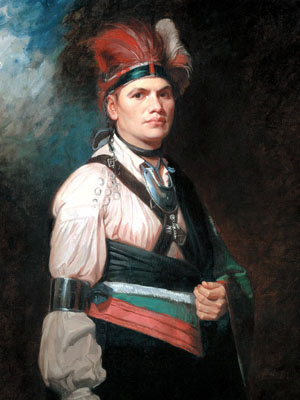
Masonic Biographies
Joseph Brant
Born: Tuesday, 01 January 1743
Died: Tuesday, 24 November 1807
Joseph Brant was Chief of the Mohawk Tribe and the Six Nations Indian Confederation, as well as a Freemason and devout member of the Church of England.
Joseph Brant was one of the most famous and renowned Native American chiefs in the 18th century. Born in 1743 in what is now Ohio, he served with distinction during the French and Indian War, and later on the British side during the American Revolutionary War. He was the chosen war Chief of the Mohawk Indian tribe, and later the 6-nations Indian confederation, as well as being Freemason and a devout member of the Church of England.
He attended the university that would become Dartmouth as a teen, where studied western literature and English. He would later put this upper-class British education to good use by rubbing elbows with British high society, with immense benefit to himself and those he represented. He became good friends with the British Governor for the Indian tribes, who ended up marrying his sister. Together they worked to protect the territorial autonomy of the local people’s against the encroachment of European settlers.
When France and England went to war in the French and Indian war, Brant led his people into battle on the British side, having been promised protection and recognition. However, the British forces were uninterested in using the native troops as anything other than scouts. As a lucky consequence of this, they evaded much of the slaughter of war in that conflict.
When the American revolution broke out, Brant immediately allied with the British again, reading the writing on the wall that if American won, it would expand west and push his tribe and others like it off their lands. He was elected war chief of the six-nations Indians and went to England to secure the alliance with the British Empire. It was there that he was initiated into Freemasonry. There is debate over what lodge he was initiated into, but the year and month was April 1776, and King George III presented him with his Masonic apron. He took the Masonic spirit of liberty, equality, and fraternity to heart, and refused to bow to the King, instead of meeting him as an equal. The King reportedly took this well, recognizing Brant as a prince of equal standing.
During the American Revolution, he fought in several battles, where his Masonic virtues, of mercy and relief, were evident in the sparring of officers and the halting of massacres. He fought valiantly and with courage, and when the British lost the war, he used all his diplomatic skill and connections to preserve the territory of the Mohawk against further encroachments. He became the first master of Mohawk Village Lodge No. 11, which he had helped found. He found in Masonry a platform to spread and reinforce his ideas and devoted much time to it.
He would spend the rest of his life fighting against the growing tide of settler-colonialism in North America and would be largely successful. He is today remembered as a great peacemaker for uniting the six nations under his leadership, as a fierce warrior for his exploits in war, and as a true and faithful brother for his conduct towards his fellow human beings. He died in 1807 after having migrated his tribe to Canada to avoid American expansion and successfully built a stable home for them there.
